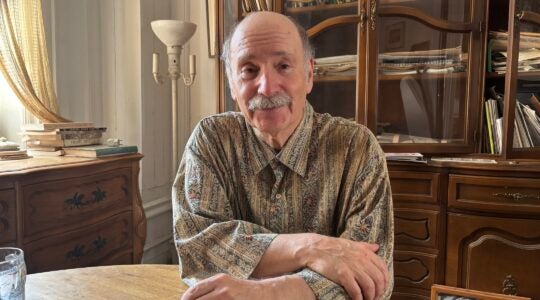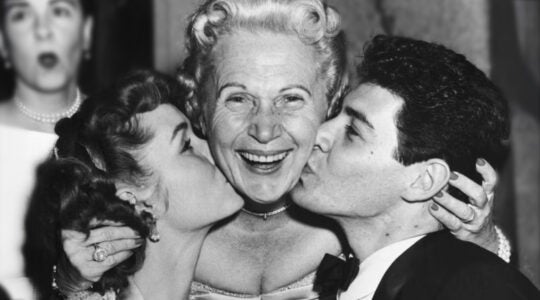There were no political speeches given or placards raised among tens of thousands of ultra-Orthodox who huddled under umbrellas Sunday in Lower Manhattan.
There was only the steady hum and slow sway of men and women separately at prayer, calling upon God through the Psalms to right what they see as the wrongs of Israel: its people and its government.
"Redeem Israel from all its iniquities," the crowd, estimated at 20,000 to 50,000, beseeched through the recitation of Psalm 130. "If you should take account of iniquities, my Master, who would survive?"
In another psalm, No. 69, the crowd decried that "mighty are those who want to cut me off, my enemies that pursue falsehood."
The 90-minute gathering, which stretched over a 12-block radius, followed similar recent events in Israel in which as many as 250,000 haredim, or rigorously Orthodox Jews, came together en masse to protest recent decisions by Israel’s Supreme Court. The rulings include an end to draft exemptions for yeshiva students, allowing non-Orthodox Jews to serve on religious councils and allowing kibbutzim to transact business on Shabbat.
A similar demonstration organized by Satmar chasidim was scheduled for March 4 in front of the Israeli Consulate on Second Avenue.
The ad-hoc American organization that organized Sunday’s gathering, Am Echad, or one nation, insists the purpose of the assemblage was to convene with God and beseech His intervention, and not to make a political statement.
"There is a long Jewish tradition of reaching out to God at a time of crisis," said Rabbi Avi Shafran, a spokesman for the organization as well as for Agudath Israel of America, which promoted the event.
But some observers say the very presence of what many media described as a "sea" of Orthodox Jews is a political message in itself.
"The message this sends out is, ‘You think we are negligible in numbers, but let us show you how many there are,’" said sociologist Samuel Heilman, author of several books on ultra-Orthodoxy. "The message behind all these gatherings is ‘you’re not going to dismiss us.’"
The choice of a prayer service rather than fiery speeches, said Heilman, conveyed a sense of divine connection.
"Some people protest to the powers that be on this Earth, which are temporal powers," he said. "These folks have to believe they have a direct line to God, so they go directly to God, asking him to answer their prayers and strike down, as it were, those not true to his word and commandments."
Heilman, who teaches at the City University of New York Graduate Center, believes the rally was an indirect response to the recent conference of the Modern Orthodox group Edah, which drew some 1,500 to a Manhattan hotel.
Edah takes no position on the issue of religious pluralism in Israel, and other Modern Orthodox umbrella groups declined to take part in Sunday’s rally. But Dr. Mandell Ganchrow, president of the centrist Orthodox Union, did applaud the effort.
"They are doing a credible job, and they are representing their issues properly," he said of the organizers.
Said Heilman, "A sea of black is a visual which the Modern Orthodox can never compete with."
Rabbi Shafran denied any consideration of the Edah conference. "It does not register on our radar screen," he said.
One participant in the gathering, Rabbi Harry Reichel of Flatbush, Brooklyn, argued that the Israeli Supreme Court’s actions are "undoing one of the fundamental pillars upon which the state was founded."
Rabbi Reichel, a law professor at the University of Pennsylvania and Agudah’s representative to the United Nations, said Israel’s Declaration of Independence contained language which asserts that "everything should be done to prevent the splitting of Israel into two or more than two."
The first signatory, he noted, was David Ben Gurion, "who was accepting in very strong and unequivocal terms the need to preserve Jewish unity."
Rabbi Reichel called the turnout "remarkable considering the inclement weather. We’re doing what Jews traditionally do in difficult times: turning to our book of Psalms, composed by King David, into which he imbedded particular powers to invoke divine mercy and compassion.
"Overall it was a kiddush Hashem," he said, using the Hebrew term for sanctification of God’s name.
But one critic of the event viewed it with scorn, even suggesting that the weather was a sign of God’s disapproval.
"The fact that it was pouring said that God was weeping on this whole affair," said Rabbi Ammiel Hirsch, executive director of the Association of Reform Zionists of America-World Union, a leading activist for Israeli religious pluralism. "The fact that most of these people are non- or anti-Zionists renders doubt as to their credibility" in protesting the Israeli government, he said.
Rabbi Hirsch added that the protests here and in Israel should hearten advocates of pluralism. "These rallies are not signs of strength but signs of weakness. … They perceive, with good reason, that their monopoly is slipping away."
The New York Jewish Week brings you the stories behind the headlines, keeping you connected to Jewish life in New York. Help sustain the reporting you trust by donating today.




